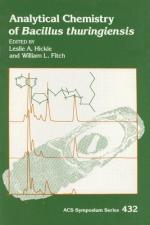|
This section contains 144 words (approx. 1 page at 300 words per page) |
Bacillus thuringiensis, or B.t., is a family of bacterial-based, biological insecticides. Specific strains of B.t. are used against a wide variety of leaf-eating lepidopteran pests such as European corn borer, tomato hornworms, and tobacco moths, and some other susceptible insects such as blackflies and mosquitoes. The active agent in B.t. is toxic organic crystals that bind to the gut of an insect and poke holes in cell membranes, literally draining the life from the insect. B.t. can be applied using technology similar to that used for chemical insecticides, such as high-potency, low-volume sprays of B.t. spores applied by aircraft. The efficacy of B.t. is usually more variable and less effective than that of chemical insecticides, but the environmental effects of B.t. are considered to be more acceptable because there is little non-target toxicity.
|
This section contains 144 words (approx. 1 page at 300 words per page) |


